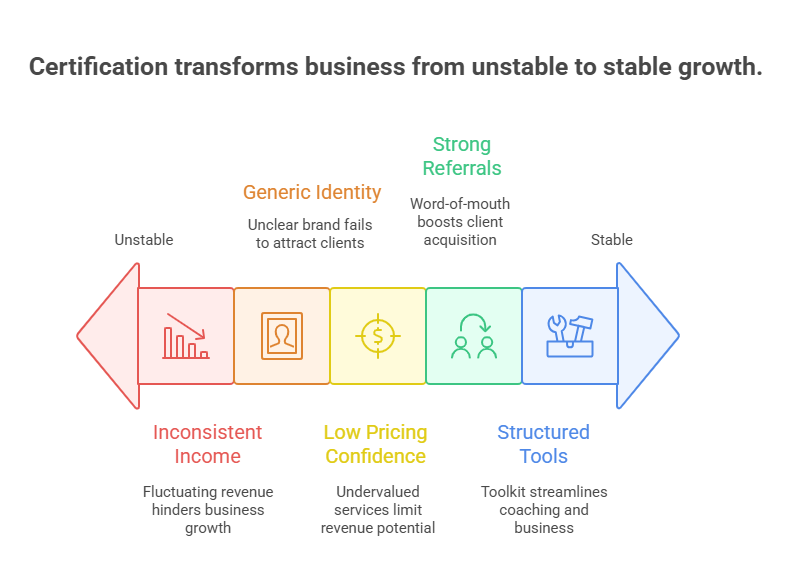2025 Health Coach Certification Trends: Future-Proof Your Career Now
The coaching industry is evolving at breakneck speed, and 2025 is shaping up to be a make-or-break year. Health coaches who adapt to certification trends will secure long-term growth, while those ignoring them risk irrelevance. With the rise of digital health, corporate wellness integration, and state-recognized standards, certification has become the entry ticket to credibility and contracts. Leveraging ANHCO’s strategic expansion guide and certification roadmaps like the Maine coaching credential guide, we’ll break down the emerging certification shifts you need to master.
1) Trend 1: Certifications aligning with digital health standards
Digital health integration is no longer optional. Certifications are now embedding telehealth compliance, app-based coaching, and data privacy modules. ANHCO’s outsourcing efficiency blog highlights how virtual delivery requires certified competency in HIPAA-equivalent safeguards. Coaches without these credentials may be excluded from insurance-backed programs or corporate partnerships.
2) Trend 2: Growing demand for niche specializations
Generalist coaches face stiff competition. Certifications in weight loss, corporate wellness, and stress resilience are dominating ANHCO’s 2025 enrollment. The Illinois certification roadmap shows how specialization attracts premium clients and corporate contracts. A credential-backed niche signals both expertise and scalability.
| Trend | Description | Impact on Coaches | Opportunity |
|---|---|---|---|
| Digital Health Integration | Telehealth, apps, compliance | Essential for virtual practices | Global online coaching |
| Niche Specialization | Weight, stress, corporate | High client demand | Premium pricing |
| Corporate Wellness | Employer-backed coaching | Certification required | Stable contracts |
| Global Accreditation | Internationally recognized | Boosts mobility | Cross-border practice |
| AI Integration | Using coaching tech tools | New core modules | Efficiency gains |
| Evidence-Based Training | Science-backed methods | Higher credibility | Research partnerships |
| Group Coaching Models | Scaling programs | Certification validation | Increased income |
| Insurance Recognition | Credential-based access | Uncertified excluded | Broader reach |
| CE Credit Integration | Ongoing learning required | Keeps coaches relevant | Expands skill set |
| Hybrid Learning | In-person + online training | Greater accessibility | Diverse enrollments |
| Global Directories | Certified listing databases | Enhanced visibility | More client referrals |
| Performance Tracking | Certification-linked metrics | Standardizes results | Data-driven credibility |
| Cross-Disciplinary Programs | Nutrition + coaching | Broader value offering | Multi-niche authority |
| Regulatory Alignment | Government approvals | Ensures compliance | Expands legal scope |
| AI-Assisted Study Tools | Learning with AI platforms | Faster prep | Higher pass rates |
3) Trend 3: Corporate wellness certifications dominating contracts
Employers want evidence-backed, certified coaches for their staff. ANHCO’s corporate team-building guide shows that businesses increasingly require certification verification before partnerships. This creates demand for coaches holding organizational wellness credentials — a growth market expected to double by 2028.
4) Trend 4: AI and evidence-based modules in certification programs
Artificial intelligence is reshaping how certifications are delivered and applied. Programs now integrate AI-driven coaching apps, digital monitoring, and analytics training. Meanwhile, evidence-based approaches (nutrition science, behavioral health) are being embedded in ANHCO’s Idaho certification curriculum. This dual trend ensures coaches not only leverage tech but also remain grounded in proven science.
5) Trend 5: Insurance and regulatory recognition
Governments and insurers are increasingly requiring verified certifications for reimbursement or recognition. ANHCO’s hidden revenue streams blog confirms that uncertified coaches are often barred from insurance-linked programs. Certification is fast becoming a legal safeguard and growth gateway.
Poll: Which 2025 certification trend matters most for your career?
6) Future-proofing your career with certification updates
By 2025, certifications will no longer be a static achievement. They will become dynamic credentials requiring ongoing renewal. ANHCO’s financial management hacks blog shows how continuous education and niche stacking future-proof income. Staying ahead means embracing certifications not just as qualifications, but as strategic investments that align with market, tech, and regulatory shifts.
FAQs
-
Specializations in corporate wellness, stress resilience, and digital health will lead. ANHCO’s Kansas certification roadmap highlights employer preference for these niches.
-
AI-powered prep tools are already shortening study times and improving pass rates. They integrate into ANHCO’s evolving curriculums.
-
Yes, but with limited growth. Without certification, coaches miss insurance eligibility, contracts, and premium clients.
-
Yes. More ANHCO programs are globally accredited, allowing cross-border coaching practices.
-
Enroll in ANHCO programs offering digital health, specialization tracks, and CE credits to stay ahead. The Indiana certification guide provides pathways for building global-ready credentials.


